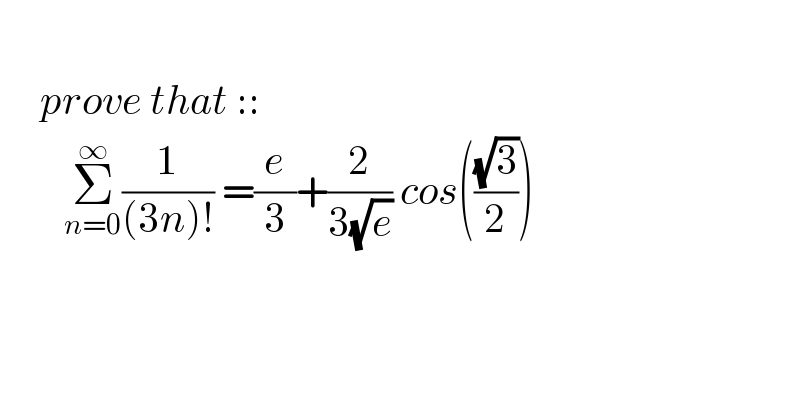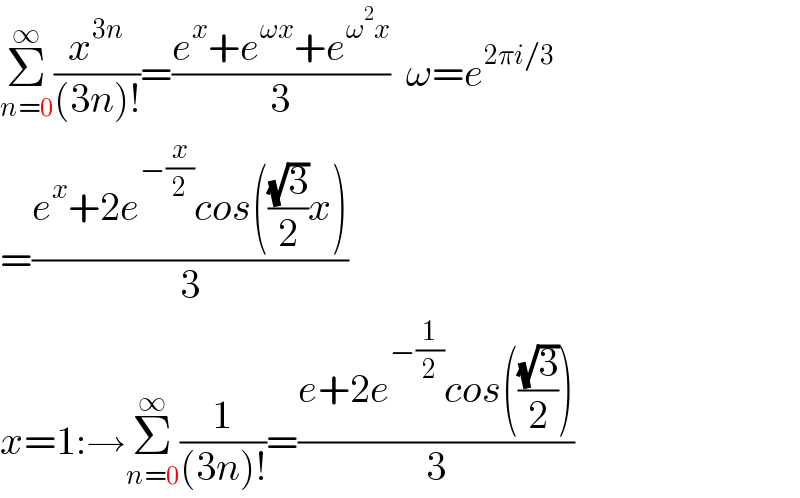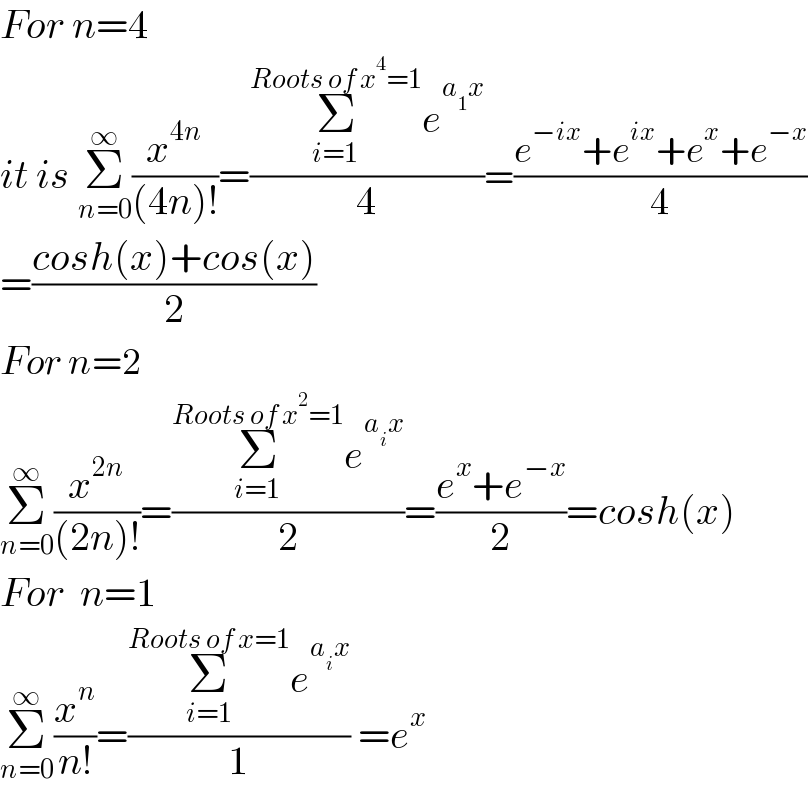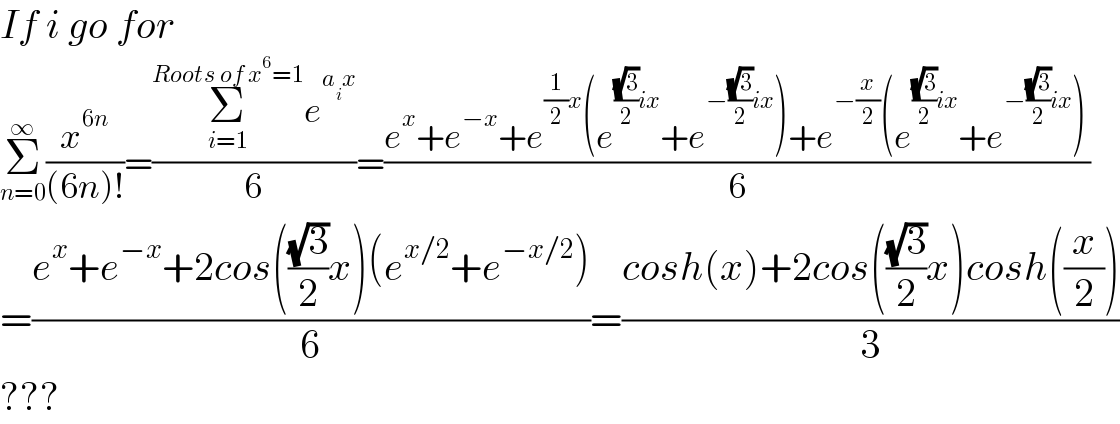
Question Number 139457 by mnjuly1970 last updated on 27/Apr/21

$$\:_{} \:\:\: \\ $$$$\:\:\:\:\:{prove}\:{that}\::: \\ $$$$\:\:\:\:\:\:\:\:\underset{{n}=\mathrm{0}} {\overset{\infty} {\sum}}\frac{\mathrm{1}}{\left(\mathrm{3}{n}\right)!}\:=\frac{{e}}{\mathrm{3}}+\frac{\mathrm{2}}{\mathrm{3}\sqrt{{e}}}\:{cos}\left(\frac{\sqrt{\mathrm{3}}}{\mathrm{2}}\right) \\ $$$$ \\ $$
Answered by Dwaipayan Shikari last updated on 27/Apr/21

$$\underset{{n}=\mathrm{0}} {\overset{\infty} {\sum}}\frac{{x}^{\mathrm{3}{n}} }{\left(\mathrm{3}{n}\right)!}=\frac{{e}^{{x}} +{e}^{\omega{x}} +{e}^{\omega^{\mathrm{2}} {x}} }{\mathrm{3}}\:\:\omega={e}^{\mathrm{2}\pi{i}/\mathrm{3}} \\ $$$$=\frac{{e}^{{x}} +\mathrm{2}{e}^{−\frac{{x}}{\mathrm{2}}} {cos}\left(\frac{\sqrt{\mathrm{3}}}{\mathrm{2}}{x}\right)}{\mathrm{3}}\: \\ $$$${x}=\mathrm{1}:\rightarrow\underset{{n}=\mathrm{0}} {\overset{\infty} {\sum}}\frac{\mathrm{1}}{\left(\mathrm{3}{n}\right)!}=\frac{{e}+\mathrm{2}{e}^{−\frac{\mathrm{1}}{\mathrm{2}}} {cos}\left(\frac{\sqrt{\mathrm{3}}}{\mathrm{2}}\right)}{\mathrm{3}} \\ $$
Commented by Dwaipayan Shikari last updated on 27/Apr/21

$${For}\:{n}=\mathrm{4} \\ $$$${it}\:{is}\:\underset{{n}=\mathrm{0}} {\overset{\infty} {\sum}}\frac{{x}^{\mathrm{4}{n}} }{\left(\mathrm{4}{n}\right)!}=\frac{\underset{{i}=\mathrm{1}} {\overset{{Roots}\:{of}\:{x}^{\mathrm{4}} =\mathrm{1}} {\sum}}{e}^{{a}_{\mathrm{1}} {x}} }{\mathrm{4}}=\frac{{e}^{−{ix}} +{e}^{{ix}} +{e}^{{x}} +{e}^{−{x}} }{\mathrm{4}} \\ $$$$=\frac{{cosh}\left({x}\right)+{cos}\left({x}\right)}{\mathrm{2}} \\ $$$${For}\:{n}=\mathrm{2} \\ $$$$\underset{{n}=\mathrm{0}} {\overset{\infty} {\sum}}\frac{{x}^{\mathrm{2}{n}} }{\left(\mathrm{2}{n}\right)!}=\frac{\underset{{i}=\mathrm{1}} {\overset{{Roots}\:{of}\:{x}^{\mathrm{2}} =\mathrm{1}} {\sum}}{e}^{{a}_{{i}} {x}} }{\mathrm{2}}=\frac{{e}^{{x}} +{e}^{−{x}} }{\mathrm{2}}={cosh}\left({x}\right) \\ $$$${For}\:\:{n}=\mathrm{1} \\ $$$$\underset{{n}=\mathrm{0}} {\overset{\infty} {\sum}}\frac{{x}^{{n}} }{{n}!}=\frac{\underset{{i}=\mathrm{1}} {\overset{{Roots}\:{of}\:{x}=\mathrm{1}} {\sum}}{e}^{{a}_{{i}} {x}} }{\mathrm{1}}\:={e}^{{x}} \\ $$
Commented by mnjuly1970 last updated on 27/Apr/21

$$\:{very}\:{nice}... \\ $$
Commented by Dwaipayan Shikari last updated on 27/Apr/21

$${But}\:{is}\:{it}\:{true}\:{for} \\ $$$$\underset{{n}=\mathrm{0}} {\overset{\infty} {\sum}}\frac{{x}^{{an}} }{\left({an}\right)!}=\frac{\underset{{i}=\mathrm{1}} {\overset{{Roots}\:{of}\:{x}^{{a}} =\mathrm{1}} {\sum}}{e}^{{a}_{{i}} {x}} }{{a}}\:??\:\:{Any}\:{idea}\:{sir}? \\ $$
Commented by Dwaipayan Shikari last updated on 27/Apr/21

$${If}\:{i}\:{go}\:{for} \\ $$$$\underset{{n}=\mathrm{0}} {\overset{\infty} {\sum}}\frac{{x}^{\mathrm{6}{n}} }{\left(\mathrm{6}{n}\right)!}=\frac{\underset{{i}=\mathrm{1}} {\overset{{Roots}\:{of}\:{x}^{\mathrm{6}} =\mathrm{1}} {\sum}}{e}^{{a}_{{i}} {x}} }{\mathrm{6}}=\frac{{e}^{{x}} +{e}^{−{x}} +{e}^{\frac{\mathrm{1}}{\mathrm{2}}{x}} \left({e}^{\frac{\sqrt{\mathrm{3}}}{\mathrm{2}}{ix}} +{e}^{−\frac{\sqrt{\mathrm{3}}}{\mathrm{2}}{ix}} \right)+{e}^{−\frac{{x}}{\mathrm{2}}} \left({e}^{\frac{\sqrt{\mathrm{3}}}{\mathrm{2}}{ix}} +{e}^{−\frac{\sqrt{\mathrm{3}}}{\mathrm{2}}{ix}} \right)}{\mathrm{6}}\: \\ $$$$=\frac{{e}^{{x}} +{e}^{−{x}} +\mathrm{2}{cos}\left(\frac{\sqrt{\mathrm{3}}}{\mathrm{2}}{x}\right)\left({e}^{{x}/\mathrm{2}} +{e}^{−{x}/\mathrm{2}} \right)}{\mathrm{6}}=\frac{{cosh}\left({x}\right)+\mathrm{2}{cos}\left(\frac{\sqrt{\mathrm{3}}}{\mathrm{2}}{x}\right){cosh}\left(\frac{{x}}{\mathrm{2}}\right)}{\mathrm{3}} \\ $$$$??? \\ $$
